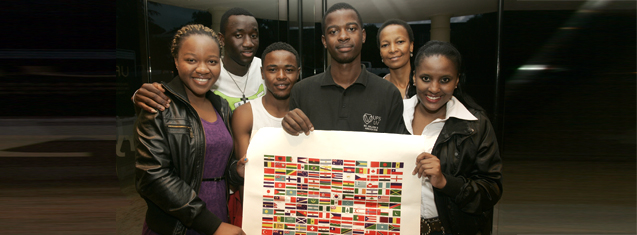Latest News Archive
Please select Category, Year, and then Month to display items
12 January 2024
|
Story Nonsindiswe Qwabe
|
Photo Sonia Small
 Since joining the UFS in 2008, Dr Grey Magaiza has worked extensively on approaches that can foster the socio-economic transformation of societies.
Since joining the UFS in 2008, Dr Grey Magaiza has worked extensively on approaches that can foster the socio-economic transformation of societies.
“The future should be one where communities can decide on their development agenda and futures. That’s the most important for me.” Dr Grey Magaiza, Deputy Director of the Centre for Gender and Africa Studies (CGAS) and Head of the Community Development programme on the Qwaqwa Campus, is passionate about capacitating communities to be agents of change and advancement. His vision for the future emphasises the empowerment of communities to take charge of their development by actively participating in decision making and the implementation of development projects that can improve their lives.
Since joining the UFS in 2008, Dr Magaiza has worked extensively on approaches that can foster the socio-economic transformation of societies. Over the years, he has crafted his research speciality into one that he is most proud of – being an interdisciplinary scientist immersed in the development of communities.
“I’m in a fortunate position of researching what I like. I say ‘fortunate’, because I’ve taken the time to understand what I’m passionate about, which is the overall field of rural livelihoods and livelihood futures – in short, community development. My research starts from an engaged university, understanding the elements that a university must use to enhance transformation and relevance to its immediate community in terms of development.”
One of the ways he has done this is by looking at social entrepreneurship as a development approach for young people in a rural setting. Through workshops with non-profit and civic organisations in Qwaqwa, Dr Magaiza has been helping these organisations to map out their needs and actively meet them through the involvement and support of external role players.
“We understand that communities are part of the national development agenda, but even that national agenda respects community knowledge and intentions and allows communities to shape their identity. A critical enabler of this is community organising. You bring back the capacity in communities to have dialogues on issues affecting them as spaces for engagement, knowledge exchange, and for people to just talk about their way forward.”
By enabling communities to define their development agenda, they can address their specific needs, challenges, and aspirations, he said. “When I look at livelihood futures, it’s quite an exciting aspect of my work – it’s like looking into a fortune tellers’ globe, because you’re not deciding for communities what they should do, but the communities themselves take those decisions.”
Crossing borders, merging boundaries
2014-02-25
 Photo: Johan Roux
Photo: Johan Roux
Senior and first-year international students recently experienced the warm embrace of the university. The Office for International Affairs and the SRC International Affairs hosted a welcoming gala dinner for their students.
SRC member: International Student Council, Brian Hlongwane, emphasised why this group is so important to the university – helping to ensure the international students feel that they are an integral part of our three campuses.
Rudi Buys, Dean of Student Affairs, encouraged these students to immerse themselves in campus life in order to help build bridges between cultures. “Own your space, engage in and facilitate conversations around issues at this university. Do not hold back and become a spectator, know that you have the same responsibilities as any registered student at the UFS,” Buys said.
Dineo Gaofhiwe-Ingram, Head of the Office for International Affairs, spoke about the complexities of the country that international students now face. She urged students to find their role in the student community across the three campuses. In addition, they need to know their rights as well as their responsibilities. “You all deserve to be treated, and taken well care of, like any other registered student on this campus. Nothing should set you apart from the rest,” Gaofhiwe-Ingram stressed.